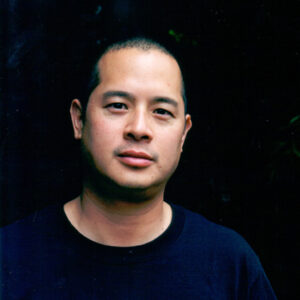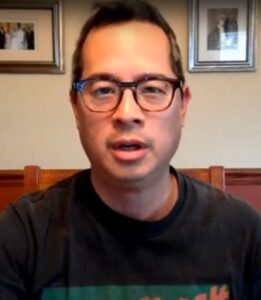Jeff Chang: “The Lincoln Brigade’s Example Is Poignant and Inspiring”
Here is the keynote address that Jeff Chang gave at ALBA’s 2022 Bay Area Gala. Click here to see the videorecording.
Greetings, my name is Jeff Chang and I’m honored to be able to speak with you all at the Abraham Lincoln Brigade Archives. I’m a writer and a cultural organizer. I’m someone who like many of you shares an interest in social history and works in the arts of documentation, of capturing the facts and the feel of what people did and how and why they were moved to do what they did.
And so I am a little bit ashamed to say that when I was first invited to speak by Richard Bermack, I did not know much about the Abraham Lincoln Brigade. What I knew of the Spanish Civil War, I knew from culture. As someone very young I had been enchanted by hip-hop and punk rock. I had heard the Clash singing about “Spanish Bombs.” I knew of Picasso’s Guernica because it was the favorite painting of an artist hero of mine named Jean-Michel Basquiat.
And now after several weeks of immersing myself belatedly in the work of you all and the many other writers, musicians, and artists, especially the original freedom fighters on the ground. I’m saddened that I did not know about their story earlier. I understand that I missed one of the greatest stories in our shared history of commitment, solidarity, and love for humanity. But along with all that Joe Strummer evoked when he sang of “the hillsides ringing with ‘free the people’ and “the trenches full of poets,” I too can now hear “the echoes of 39”. They are now forever part of my memory to carry and share as well.
And yet, I also understand that this has not been by accident – that these are exactly the kinds of stories that they who maintain a violent, oppressive, brutal status quo, in which so many of us are Othered, are humiliated, are segregated and resegregated, are disenfranchised and disavowed, these are the stories they have tried to bury, throw dirt upon.
When I read about the Nazis using the lands of the indigenous people of Spain as target practice for their bombers and air fighters, I thought of Vieques in Puerto Rico and I think of Makua Valley on O’ahu and Kaho’olawe, where the American war machine destroyed sacred sites and rendered the land unplantable. Justice is about restoring the land to those who know it, who cherish it, who care-take it. This was what the Brigade fought for.
When I read about the ways in which the Franco regime stamped out the cultures and languages of the Basque and Catalan peoples, I think about the ways my ancestors’ tongues were silenced, that only now have my nieces and nephews and I myself have been able to learn ‘ōlelo Hawai’i, the Hawaiian language, three generations after the language was officially suppressed through forced Americanization. Cultural justice is about the healing and remedying of the erasure, suppression, and marginalization of people’s artistic and cultural practices, languages, and expressions. This was what the Brigade fought for.
That poor and working-class Americans and even some with privilege, who had no or little experience with a people or a culture a world away but would go there to give their lives for their freedom and ours is poignant and inspiring.
As someone who thinks about narrative power, one thing I know is that we always have an extra burden in our work compared to those whose job it is merely to defend the status quo. We have to convince majorities to believe in and act toward a world they have not yet seen. It’s easy to criticize visionaries, in the US it’s a pastime. But we have imagination on our side, we have joy on our side, we have the future on our side. We live by the creed that Toni Cade Bambara, the brilliant Black feminist author, formulated—that the job of the artist is to make the revolution irresistible.
The beauty of the story of the Abraham Lincoln Brigade is that it shows us that solidarity and commitment are never in vain. These men and women persisted on the battlefield and even through years of persecution after they returned home. But through these lives of solidarity and commitment we were all able to see windows of freedom open in Spain, South Africa, and even the U.S., even if it was decades after they fought, and their stories tell us what we are all capable of becoming together.
One of the most beautiful sayings to come out of this last decade of social uprisings – from Black Lives Matter to #metoo to the movement of undocumented youth to those supporting the Ayotzinapa 43 – is this one from the Greek poet, Dinos Christianopoulos: “They tried to bury us, they didn’t know we were seeds.”
And so I am thankful to Joe Strummer, to Jean Michel-Basquiat, to all of you, for the telling and retelling of this story. And most of all, I am moved anew by the freedom fighters from the Jarama Valley and the Ebro River to Standing Rock and Mauna Kea who choose to be seeds, who choose to fight and to pass it forward. Stories are always alive, as long as we caretake them, and we do this so that they will be there in the times we most need them.
You don’t really need me to tell you that that time is now. In my work we have done a lot and seen a lot of public opinion surveys of late — and the one thing we have learned is that, in this moment especially, Americans are very scared. They are not sure if they’re safe – from pandemics, guns, climate change, or war. They don’t feel valued and they don’t feel heard. They feel like their freedoms are under attack. When people are fearful — and we have seen how fearful people can be over the past decade, white people and people of color — we have to ask: how do we build community, bring people beyond their fear to embrace each other?
President Biden, who is not known as a radical anything, who at one time was a staunch defender of segregation, actually got it right when he said that a battle is now being waged for the soul of America. It is a clash of competing narratives—the story of a great America in danger of being lost forever vs. the story of a hopeful emerging America, the end of American civilization or the beginning of a great national transformation.
These are times that Orwell would have recognized. When President Biden reminded us last month of the threats that fascism poses to us, Donald Trump, Jr. said it was “a speech that looked like if Mussolini and Hitler got together.” Apparently, he knows nothing about the Spanish Civil War either. It’s really not hard to wonder what side his family would have taken in 1936. His father is the same demagogue who, when challenged to deal forthrightly to prevent the spread of a pandemic, instead chose to demonize Asian Americans, leading to tens of thousands of incidents of hate and violence against us over the past two and a half years.
We are at a crossroads in our nation’s history. Shall the US continue a culture of domination of the few over the many or shall it build a culture of shared power, of what Martin Luther King Jr. called mutuality? Shall it continue to pursue a path that leads us to a burning, flooding planet where the 1% will leave the rest to die or will we come together to figure out how to make it livable and equitable for all?
The US is about to become a “majority minority.” In the next decade or so, more than half of all people in the U.S. will not be white. We will all be minorities. It’s a grand experiment on a scale that has never happened in the world. We face two major questions. The first is, how will we come together to achieve climate justice? And when we say justice, we especially the people who suffer most now from injustice – Alaska natives or Pacific Islanders who face melting caps and rising seas, communities of color and poor people who must suffer extreme heat and cold, those in the path of corporations who would poison our water and our air.
And the second is: if we are all minorities, how will we form a new majority? What values will community rest in – will we continue to tolerate a world of exploitation, extraction, and segregation, or will we be able to make a world of abundance, dignity, and equity?
In these politically polarized times, intensified by the velocity of technology, most of us feel caught in between extremes. But being in between can be a space of creativity.
What it requires first of us is to come off the fence. Being in-between means one can afford to sit on the fence, decide not to take a stand, to always reserve the privilege—while the battle rages all around—to disengage. The privilege is in not showing up. It’s time for all of us to show up.
Or as the veteran nurse Ruth Davidow memorably put it, “We learned in Spain to act, not just talk.”
And then the creativity can begin—engaging the fight to resist fascism and oppression, building the new systems of care and compassion to bring freedom to all, activating the relations of community that bring sustenance, devotion, and joy.
When I hear and read the stories of Oliver Law, Jack Shirai, Lois Orr, Ruth Davidow, Bob and Marion Merriman, and so many others—it reminds me that all of them gave their lives for a better world.
In this moment, as war explodes on the Ukrainian frontier, as the rumblings in Taiwan strait have much of Asian America on edge, as we struggle to figure out how to return to community after this atomizing event that has been the global pandemic, as many Black, indigenous, transgender, and immigrant people continue live in fear of state and individual violence, we know that It’s a time for us to find our connections, make our commitments, join together, and to act.
Thank you for your invitation. I want to wish you all the best in all you do.
Click here to see the videorecording of Jeff Chang’s keynote.
Jeff Chang is an American historian, journalist, and music critic on hip hop music and culture. His 2005 book, Can’t Stop Won’t Stop, which won the Before Columbus Foundation’s American Book Award, chronicles the early hip hop scene. His writing has appeared in URB, BOMB, San Francisco Chronicle, The Village Voice, San Francisco Bay Guardian, Vibe, Spin, The Nation, and Mother Jones.














